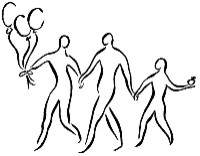Reviewing the views
Does the 58-year old Universal Declaration of Human Rights adequately address current human rights dilemmas?
 Yes. The UDHR sets forth a framework for realisation of the full scope of human rights and freedoms. By design, it is an open-ended and forward-looking document. For instance, Article Two says, that everyone is entitled to all the rights and freedoms set forth in the Declaration, "without distinction of any kind, such as race, colour, sex, language, religion, political or other opinion, national or social origin, property, birth or other status." By adding the phrase, "or other status," the UDHR's framers recognized that with time other kinds of discrimination might attract public attention, and they worked to anticipate this.
Yes. The UDHR sets forth a framework for realisation of the full scope of human rights and freedoms. By design, it is an open-ended and forward-looking document. For instance, Article Two says, that everyone is entitled to all the rights and freedoms set forth in the Declaration, "without distinction of any kind, such as race, colour, sex, language, religion, political or other opinion, national or social origin, property, birth or other status." By adding the phrase, "or other status," the UDHR's framers recognized that with time other kinds of discrimination might attract public attention, and they worked to anticipate this.
Now also the question arise that are governments legally required to respect the principles outlined in the UDHR? Yes. While the record shows that most of those who adopted the UDHR did not imagine it to be a legally binding document, the legal impact of the Universal Declaration has been much greater than perhaps any of its framers had imagined. Today, direct reference to the UDHR is made in the constitutions of many nations that realised their independence after the document was adopted. Prime ministers, presidents, legislators, judges, lawyers, legal scholars, human rights activists and ordinary people throughout the world have accepted the Universal Declaration as an essential legal code. Dozens of legally binding international treaties are based on the principles set forth in the UDHR, and the document has been cited as justification for numerous United Nations actions, including acts of the Security Council.
As oppressed individuals turn increasingly to the Universal Declaration for protection and relief, so governments have come to accept the document not just as a noble aspiration, but as a standard that must be realized. Because it is universal, a central and integral part of our international legal structure, the Universal Declaration is widely accepted as a primary building block of customary international law -- an indispensable tool in upholding human rights for all.
Unfortunately, the challenges that the UDHR addressed in 1948 are still very much present in our world. Governments continue to torture and murder individuals because of their beliefs, their ethnicity, or their opinions. Millions across the globe remain "ill-housed, ill-clad, ill-nourished." And, if we ask ourselves which of the rights, framed in 1948, might be dismissed today, we find that none may be. Who would argue that torture or slavery is necessitated by the demands of modern life or of a global economy? Those who have suggested that the rights enumerated in the Universal Declaration are outdated, seem to do so in an attempt to justify oppressive measures that undermine those rights.
Respect for the rights of every individual is enduring and the struggle against human rights violators, ongoing. More and more, individuals throughout the world have formed groups to document the suppression of freedoms set forth in the UDHR and to demand that the Declaration be fully respected in their own societies. The continued violation of human rights - and the achievements of ordinary citizens who turn to the UDHR for defence - both highlight the increasing relevance and importance of the Universal Declaration. The urgent need to protect these rights is more compelling than ever.
Source: udhr.org.